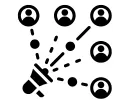Freedom Group Global
A diversified Real Estate company focused on creating freedom for all through home ownership, smart home investing and business building.
About Steve Roake &
Kimberly Genovese
Meet Steve & Kimberly – Your Guides to Real Estate, Freedom, and Fulfillment
We’re Steve and Kimberly—a dynamic duo blending strategy, heart, and adventure in everything we do. As real estate professionals, entrepreneurs, and explorers at heart, our mission is simple: help you unlock a life of abundance, flexibility, and freedom.
Steve is a passionate Realtor known for his entrepreneurial spirit and love for helping people achieve their dreams. Whether he's closing deals, creating financial peace of mind through real estate. He's a strategic thinker with a spontaneous edge, always chasing the next adventure—whether it’s belting out '90s rock, mastering a new recipe, or charting a course toward Caribbean yacht ownership.
Kimberly is the heart-centered powerhouse of the team—an inspiring world traveler, lifelong learner, and guide for transformational growth. From the slopes of Park City to spiritual retreats in India, she brings global wisdom and grounded energy into every client relationship. She reflects a drive, strategic brilliance, and joy for uplifting others. She’s passionate about helping people create prosperity through real estate, purpose, and fulfillment—both in real estate and in life.
Together, we bring a unique blend of logic, intuition, fun, and results. Whether you're buying your first home, home investing or simply exploring your next move, we’re here to help you make confident, aligned decisions with clarity and ease.
Let’s make your next chapter your most exciting one yet.

Keep in the know with our weekly updates!
The Advantage
Whether you’re looking to buy your first home or sell a long-held property, our knowledge of the local real estate market ensures you receive expert guidance every step of the way. We closely monitor neighborhood trends, property values, and emerging market opportunities, giving our clients a competitive edge when it comes to pricing, negotiation, and timing. By staying current on shifting market conditions, we help you make informed decisions that align with both your goals and budget.
Our personalized approach sets us apart from other real estate professionals. We take the time to understand your priorities—be it finding a home with top-rated schools, maximizing return on a property sale, or navigating investment opportunities. Through open communication and a dedicated focus on client satisfaction, we tailor strategies that make home buying or selling a seamless experience. From staging and marketing your listing to recommending trusted local lenders, we’re committed to ensuring every detail is handled with care.
Beyond the transaction, we pride ourselves on building lasting relationships with our clients. By offering transparent advice and ongoing support, we become your go-to resource for all things real estate—even long after the closing process. Whether you need recommendations for local contractors, tips on home improvements, or a market update on property values, our team is here to guide you. Trust us to deliver personalized service, cutting-edge market insights, and the dedicated attention you deserve for a successful real estate journey.

Advisors
Steve Roake offers expert guidance on local market trends, property values, and financing options to help you make informed decisions. By tailoring our recommendations to your unique situation, we ensure you’re confident at every step of the home buying or selling journey.

Negotiators
Getting the best deal requires skilled negotiation, and Steve Roake has the expertise to advocate for your interests. Proven tactics help you secure favorable terms—whether you’re purchasing a new home or maximizing the value of a property sale.

Problem Solvers
Unexpected obstacles can arise in any real estate transaction, and we’re here to tackle them head-on. From resolving inspection issues to navigating financing challenges, we stay proactive so you can enjoy a smoother home buying or selling experience.

Marketers
Presenting your property in its best light is crucial to standing out in a competitive market. By combining professional staging, strategic digital marketing, and impactful visuals, we generate attention and attract qualified buyers faster.

